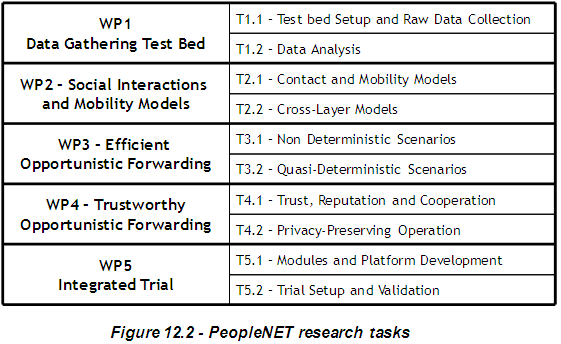More than four billions of people, today, have cellular phones. Most of those devices are equipped with short range wireless connectivity such as Bluetooth or ZigBee or WiFi. And people move and meet while engaging in their social relationships. These are facts that, if properly exploited, might push forward a new generation of provider-less networks, which we conveniently refer to as Opportunistic Social Networks (OSNs).
OSNs are a special class of Delay Tolerant Networks, where people’s personal devices play a twofold role: that of relay nodes of a network with dynamic topology and intermittent connectivity, and that of sources of localized information and providers/subscribers of proximity-based community service clouds. The attribute “Social” entails the exploitation of human mobility, contact opportunities, social relationships, and user behaviour for dramatic improvements in the efficiency of the OSN data forwarding operation.
OSNs are envisioning an ever growing interest, thanks to their cost-effectiveness, infrastructure-free nature, intrinsic robustness, resilience, and spontaneous operation, and, most important, their ability to exploit the enormous, and today mostly unutilized, short-range communication capacity of modern portable devices. OSNs appear a very promising new paradigm for complementing the “online”, real-time, user communication needs (such as voice calls) by providing support to “partially offline”, delay-tolerant, services such as content sharing, podcasting, messaging, news feeding, data dissemination, interest-based delivery of geo-tagged information, location/context-aware applications, collaborative tasks, resource pooling, and so on. And they could become the primary (or even the only possible) networking model in developing regions or when infrastructure is spare, costly or broken.
The PeopleNET project aims at challenging the key research issues (including foundational ones) which emerge when the target is to exploit human social cooperation and mobility in the design of efficient, secure, trustworthy, and privacy-preserving forwarding algorithms for data dissemination and delivery in OSNs. More specifically, PeopleNET revolves around three ambitious and tightly intertwined research objectives:
1. understand and more effectively (and more usable) model human mobility and social interaction, and boost their contact prediction capabilities by leveraging higher layer information gathered from the analysis of online behaviour and more stable social relationships, i.e. those that people maintain in either their private (e.g., social network communities) or working (e.g., first ranked e-mail destinations) life;
2. devise improved intra- and inter-community message forwarding and data-centric content dissemination approaches exploiting slowly varying social relationships and contacts, as well as scheduled and predictable mobility (such as public transportation patterns) to provide improved forwarding efficiency;
3. challenge the apparent dichotomy emerging between the usage of social personal information for forwarding purposes as antithetic to the need to protect it for security and privacy reasons, through the novel design of trustworthy forwarding mechanisms exploiting social and behavioural information in a trusted and privacy-preserving manner.
Finally, experimental assessment has a major role in PeopleNET, as it represents at the same time an enabler for the PeopleNET plans as well as the fourth project objective. Indeed, PeopleNET will start its activities by deriving mobility and social interaction patterns from both public domain trace archives as well as from custom traces produced in the early stage of the project leveraging a contact gathering application already available from prior work. Then, a subset of PeopleNET mechanisms, including advanced data forwarding approaches as well as innovative trust and privacy preserving forwarding techniques, will be integrated in a single PeopleNET Opportunistic Platform framework. These mechanisms will be validated in a real-world test bed deployed in a workplace social context environment. The trial will further support application layer information gathering from a social network application running on people’s mobile devices, and will demonstrate usability improvements through autonomic context-based radio channel selection between PeopleNET’s localized short range communication and online 3G connectivity.
The PeopleNET project is divided in Wording Package (WP) and organized as follows:

